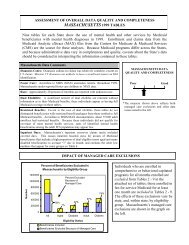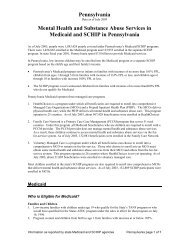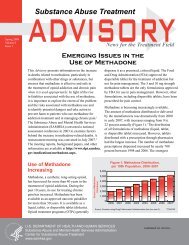Shared Decision-Making in Mental Health Care - SAMHSA Store ...
Shared Decision-Making in Mental Health Care - SAMHSA Store ...
Shared Decision-Making in Mental Health Care - SAMHSA Store ...
You also want an ePaper? Increase the reach of your titles
YUMPU automatically turns print PDFs into web optimized ePapers that Google loves.
111who belong to m<strong>in</strong>ority groups or live with<strong>in</strong> the community. Doctors and nursesmay know relatively little about the cultural experiences of m<strong>in</strong>ority mental healthconsumers, their recovery values, and how they view mental health treatment. Theymay be challenged to understand different styles of communication. In sum, somem<strong>in</strong>orities may feel they are looked upon with caution. The impact of social classshould also be considered; consumers who are less educated or have less money mayfeel uncomfortable try<strong>in</strong>g to make their wishes known to middle-class professionals.The development of culturally sensitive DAs, and of DAs that focus specifically onmental health issues that impact m<strong>in</strong>orities, use the most appropriate language, andare geared to <strong>in</strong>dividuals with low literacy (<strong>in</strong>clud<strong>in</strong>g health literacy) might help tomitigate some of these factors.RecommendationsIn guid<strong>in</strong>g the development of DAs for mental health consumers, <strong>SAMHSA</strong> might dowell to beg<strong>in</strong> with the assumption that <strong>in</strong>dividuals will need DAs <strong>in</strong> different forms,and consider the scheme laid out <strong>in</strong> this paper suggest<strong>in</strong>g the variety of formats andtechnologies available—for example, active and passive DAs. DAs with similar contentmight be developed <strong>in</strong> numerous formats: on paper, on the Web, on videotape,on CD-ROM, and for use by the <strong>in</strong>dividual alone or with assistance. Some DAsmight be developed explicitly for peer specialists to use with <strong>in</strong>dividuals or groups.In the absence of many DAs for mental health conditions, the type of generic frameworkthat offers guidance to <strong>in</strong>dividuals faced with any difficult decision might helpmeet the needs of mental health consumers. This type of paradigm might be especiallyuseful <strong>in</strong> provid<strong>in</strong>g consumers with a way to th<strong>in</strong>k about the decisions theyconfront, and with a tool they can use more than once.Develop<strong>in</strong>g DAs for mental health consumers will be challeng<strong>in</strong>g and costly. SAMH-SA can serve as a valuable resource to guide and support the process. In order forDAs to be effectively implemented, however, the provider community must be tra<strong>in</strong>edboth to accept the general concept of SDM and to know how to make the best useof DAs with consumers. Tra<strong>in</strong>ed peer specialists or mentors can play a valuable role<strong>in</strong> the implementation process, help<strong>in</strong>g providers understand the value of DAs andguid<strong>in</strong>g consumers <strong>in</strong> their use. Ensur<strong>in</strong>g the relevance and utility of DAs for l<strong>in</strong>guistic,racial, and cultural m<strong>in</strong>orities will also be critical.<strong>Shared</strong> <strong>Decision</strong>-<strong>Mak<strong>in</strong>g</strong> <strong>in</strong> <strong>Mental</strong> <strong>Health</strong> <strong>Care</strong>: Practice, Research, and Future Directions
















